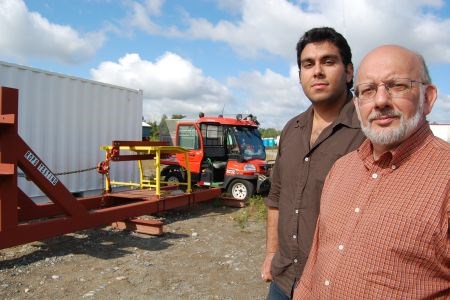Stanley Appleton Manufacturing Corp. provides in-house design, build, testing and certification of rollover protective structures (ROPS) and falling object protective structures (FOPS) in a suburb of Sudbury.
This general fabrication, welding and custom design-build firm has 20 years experience under its belt, prefabricating metal components for other manufacturers and performing subcontract work.
An eight-acre site in Val Caron’s industrial park provides ample space for 20 employees to work out of an office, and three shops: fabrication, sand-blasting and paint. Welders certified with the Canadian Welding Bureau complete products to meet ISO 9001:2000 standards.
Within the last 10 years, up to 20 per cent of the business has evolved to include this integrated offering of ROPS and FOPS for the mining and construction industries.
“This is our own process,” said Thomas Kuehne, estimating and design, Stanley Appleton Manufacturing.
“We are one of the few companies in Canada that can design, build, test and certify ROPS and FOPS in-house.”
Both ROPS and FOPS are structures on a vehicle that form part of the cabin above the driver and passengers. They are designed to minimize the likelihood of operator and passenger injury resulting from accidental overturning during normal operation. In particular, FOPS are intended to ensure that a seated operator and passenger are provided with reasonable protection from falling objects, such as rocks.
As health and safety regulations across Canada become more stringent, Kuehne said they’ve increased their national customer base within the last three to four years.
“Many of the companies that use vehicles in the mining, construction and petrochemical industry are mandated to have a protective device around the driver, and subsequently, on top of the machine,” Kuehne said.
“For mining equipment (utility vehicles) used on surface and underground, you need a ROPS and FOPS,” said Sahil (Savy) Bhardwaj, engineer technologist, Stanley Appleton Manufacturing. “On surface with uneven terrain, it is easy for a person to go up a mountain or hillside and roll over. However, underground only requires a FOPS since equipment is moving in mine corridors.”
The importance of a professional engineer’s stamp certifying the product is paramount to the structure’s integrity, as it indicates it has undergone a series of tests and is strong enough to endure a rollover or fall-on accident while preserving the life of the people inside.
The company will design, build, test and certify ROPS and FOPS for small Kubota tractors and passenger-carrying vehicles, up to and including large earth-moving machines and rock-drilling equipment. The turnaround time on a custom or OEM design is between one and two weeks, which gives the company a competitive edge.
The process involves checking for design feasibility of the request, followed by a rough estimate and time frame. The structure is designed using CAD software. A stress analysis is simulated to show the strengths and weaknesses of the structure. Once it is determined “on paper” that the design is sufficient, the product is made with high-grade structural alloys.
A non-destructive test is performed on the welds to verify their strength.
Depending upon the request, the company uses its mechanical custom-designed jig for testing. If necessary, it will manufacture a test device to accommodate the vehicle being fitted. A series of strength tests are performed with a load applied in three different directions.
The professional engineer conducts and oversees the certification of the unit itself, according to Canadian Safety Association (CSA) and Society of Automotive Engineers (SAE) standards.
This certification stamp is acknowledged in every Canadian province except Quebec, which has its own set of standards.
As word gets out about this niche in-house service, Kuehne has received requests from across the country. It is his hope to increase this portion of the business and branch out to the U.S. market.




